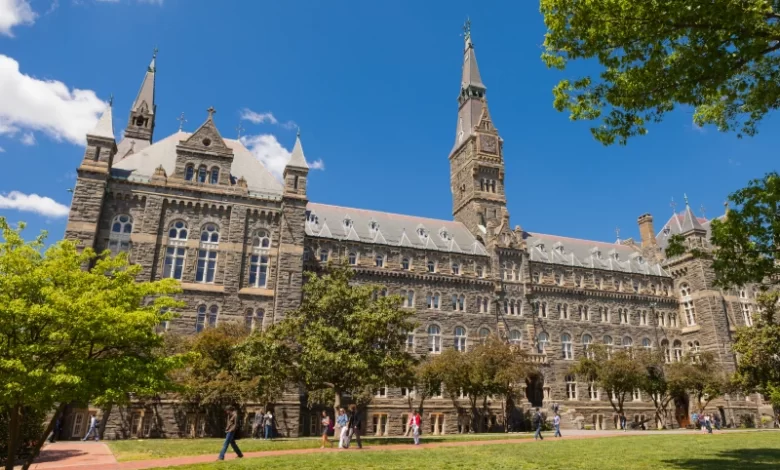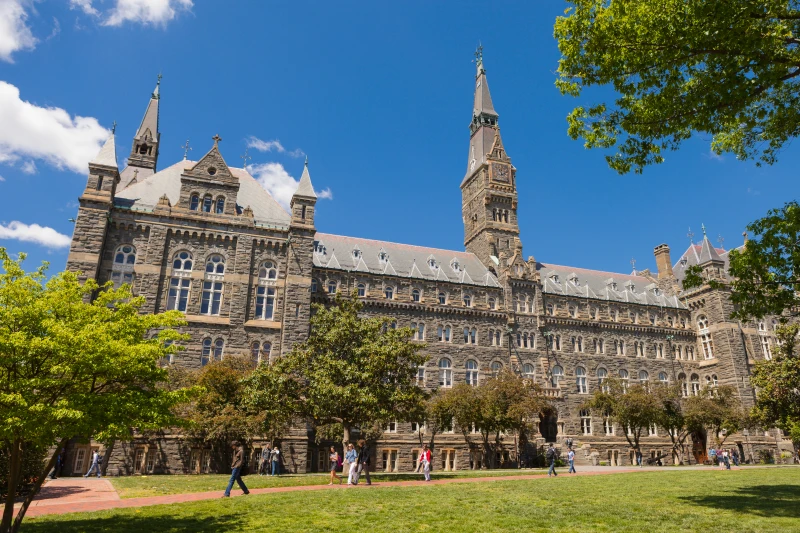Georgetown law student wins petition for pregnancy accommodations after initial denial

 Georgetown University, located in Washington, DC, is the nation's oldest Catholic and Jesuit university. / Credit: Rob Crandall, Shutterstock.
Georgetown University, located in Washington, DC, is the nation's oldest Catholic and Jesuit university. / Credit: Rob Crandall, Shutterstock. CNA Staff, Nov 26, 2024 / 07:00 am (CNA).
When Georgetown Law student Brittany Lovely, who is scheduled to give birth in December, shortly before final exams, asked for permission to take her test early, late, or remotely, the answer she got from the Catholic university was a flat denial.
Citing university policy, the school’s administrators told Lovely that granting her accommodations would be “inequitable to other non-birthing students in her class,” she told the Washington Post.
“Motherhood is not for the faint of heart,” she said she was told. Her was given a choice: she could either take the exam soon after childbirth with her newborn or fail and request to withdraw from the class. Even when her doctor weighed in, calling Lovely’s request both “reasonable and necessary,” the law school refused to budge.
Only after students banded together to organize a petition, which quickly went viral, did Lovely get permission to schedule her exam ahead of the birth of her baby.
Lovely said in a letter shared with CNA that she has “finally received the accommodations I’ve been requesting for months for my upcoming finals,” but shared her fear that other pregnant students may face similar challenges with the administration.
The university changed its exam accommodations and deferral policy “for this semester only,” Lovely explained. She requested that the university “make a public commitment to reforming its policies regarding accommodations moving forward,” she noted in the letter.
“They agreed to work with me on a just and equitable policy agenda for pregnant, childbearing, and childrearing students in the coming months,” Lovely said of Georgetown Law.
A university spokesperson confirmed with CNA that the administration “reached a mutually agreeable solution” with Lovely. The university declined to comment on the specifics of Lovely’s case.
“Georgetown is committed to providing a caring, supportive environment for pregnant and parenting students,” the spokesperson said, noting that Georgetown provides resources for students “while they are pregnant or parenting including pregnancy-related adjustments from the Office of Title IX Compliance, and disability accommodations from our Academic Resource Center.”
But for Lovely, “the fight is not over yet.”
“No student should be forced to choose between their education, health, or the health of their family,” she said. “My classmates and I will continue advocating until it is certain Georgetown Law does not force any students to make that choice again.”
At Georgetown Law, only the Office of Registrar has the power to grant exam deferrals and exam rescheduling for finals, not the professor.
Georgetown Law will consider exam deferrals for several reasons, including “childbirth during the exam period or immediately preceding the exam period,” according to its website. The administration will also consider deferrals for physical or mental illness, a death in the family, car accidents, religious observance, military commitment, and other “extraordinary circumstances.”
But according to Lovely, she is not the only one who has faced challenges getting accommodations.
Peers and alumni “have shared their own horror stories of trying to get reasonable accommodations at Georgetown Law for their childbirth, medical emergencies, and disabilities, only to be offered a generalized solution of more time for an exam,” Lovely said. “They have told me the callous responses to their requests during their most vulnerable times.”
“As I have said from the beginning, this was never just about me — this is about all pregnant, childbearing, and childrearing students and about all students with disabilities or those needing accommodations, present and future,” Lovely said.
A moral duty
Lovely’s classmates launched the petition on her behalf last week, stating that “Georgetown Law has a legal and moral duty to support pregnant students during the regular school year or finals.”
Post-partum recovery usually takes about six weeks after childbirth. According to the American College of Obstetricians and Gynecologists, “the weeks following birth are a critical period for a woman and her infant, setting the stage for long-term health and well-being.” Childbirth often comes with medical challenges that require a long recovery, especially if a woman faces medical issues such as tearing or Cesarean section.
“Georgetown Law suggested Brittany bring her days-old child to campus a few days after birth, with minimal recovery, to take the exam with more time so she can breastfeed her newborn baby during the exam,” the petition noted. “They told her, ‘Motherhood is not for the Faint of Heart.’”
Newborn babies need to be fed every two to three hours and are more susceptible to germs as their immune systems are not fully developed, meaning they are at a higher risk of developing infections. Few babies are born on their exact due date, and physicians often advise that parents avoid bringing their newborn to crowded places.
Based in Washington, D.C., Georgetown University is a Jesuit university and the first Catholic higher education institution in the United States. According to its website, Georgetown University aims to approach education from the central Jesuit tenet of “cura personalis,” a Latin phrase meaning “care of the whole person.”
One alum, Max Siegel II, argued that the administration’s refusal of Lovely’s accommodation “contradicts this fundamental value.”
“Cura Personalis calls on us to provide care and individualized attention to each person, respecting their unique circumstances and concerns,” Siegel said in a post in which he urged students to sign the petition. Siegel heads the Student Bar Association, the law school’s student government.
The Catholic Church teaches the importance of the “Life and Dignity of the Human Person,” one of seven themes of Catholic Social Teaching. “Human life must be respected and protected absolutely from the moment of conception,” according to the Catechism of the Catholic Church (2270).
In line with this teaching, some Catholic colleges such as Belmont Abbey College in North Carolina and the University of Mary in North Dakota offer maternity housing programs for student mothers. UMary’s maternity home program made headlines last year after its first student mom graduated with her daughter.
In addition to concerns that the administration’s attitude goes against the university’s Jesuit Catholic values, supporters of Lovely said that Georgetown’s decision violated Title IX, the federal civil rights law designed to prevent discrimination against women in higher education institutions that receive public funding.
Siegel, and the student-led petition, noted that the administration “fails to meet the requirements of Title IX, which ensures a fair and equitable educational environment for all students.”
“Title IX prohibits education institutions from discriminating against students based on sex, including current, potential, or past pregnancy or related conditions,” the petition noted. “An accommodation is not unreasonable and must be offered by the school unless it ‘fundamentally alters’ the nature of its program.”
Lovely said she was particularly concerned that Georgetown cited equity as a reason for denying pregnancy accommodations.
“I want to make it clear — an inequitable policy, for example, is one that forces me (or any student) to spend time fightingfor a basic right under the law rather than preparing for my finals like the rest of my peers,” she said. “An equitable policy is one where no student has to go to these great lengths again to receive reasonable accommodations.”



